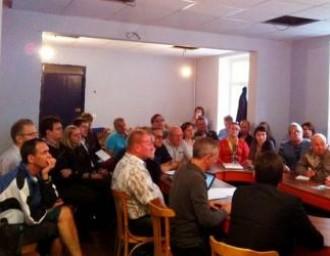Though the Belarusan President in the end of 2012 spoke about the necessity to develop local self-government in the country, it is important what actions will follow his words.
This was reported to the
EuroBelarus Information Service by the chairman of the Enlightenment Public Association “Lew Sapieha Foundation”
Miraslau Kobasa when summing up the results for the past year.
He recalled that the President, when speaking before the newly elected Council of the Republic, spoke about the necessity to develop local self-government in the country. Notably, the head of state mentioned that special attention should be attached to the citizens’ involvement in solving problems locally. “It can only be welcomed, - said Miraslau Kobasa, - but for now only words were said; we have to observe what actions will follow”.
On the whole, Miraslau Kobasa looks upon 2012 as upon a normal year: we managed to fulfill almost everything that was planned. Among negative results the chairman of the Enlightenment Public Association “Lew Sapieha Foundation” notes problems with projects’ registration and great attention perceived from the side of some state bodies, as well as the problem of the shortage of skilled personnel.
But there are many positive results as well. In 2012 the fond has published two new books: “Association of Local Self-Governments” and “Local Self-Government: monitoring of the basic legislative acts for 2010-2011”. Besides, two newsletters on the subject of local self-government were published.
For the representatives of NGO, political parties and local activists approximately ten seminars were conducted, which were aimed at the citizens’ involvement in the process of preparation and decision-making on local level.
The work on the concept of local self-government is almost finished. To complete the documents two more months are needed. After this the concept that accumulates expert suggestions in relation to the local self-government in Belarus will be distributed for discussion to all potentially interested subjects – in different political parties, research institutions, NGO, as well as the state structures. “We will wait for the response, as the concept of the local self-government reform is a political question”, -noted Miraslau Kobasa.
In 2012 Lew Sapieha Foundation together with the Association of Local Democracy Agencies (ALDA) was a consultant in the project aimed at development of the civil initiatives on local level. After the content nine finalists were chosen, who later got financing for their projects which now are already coming to an end (all these projects were registered by the Department of Humanitarian Affairs). Notably, one of the projects was devoted to the creation of the Struve Geodetic Arc Museum in Halshany. In Svetlahorsk Region teachers wrote a project of creating ecological path to educate students. Socially orientated projects (aid to children with disabilities) and the project to revive traditional national crafts were also presented. According to Miraslau Kobasa, in 2013 the continuation of the project after the similar pattern might take place.
Among the plans for 2013 Lew Sapieha Foundation is going to carry on activity connected with the development of the local self-government. When the work on the above-mentioned concept of local self-government will be finished, the conference will be organized where the draft document will be presented. The foundation is going to take active participation in the Eastern Partnership, through the development of “Roadmaps”, too, as well as through work on “Dialog on Modernization of Belarus”. There are some plans concerning the publication of new editions and traditional newsletter “Local Self-government”. The representatives of Lew Sapieha Foundation are also willful to participate in the Congress of Local and Regional Authorities of the Council of Europe in the observers’ quality.




























